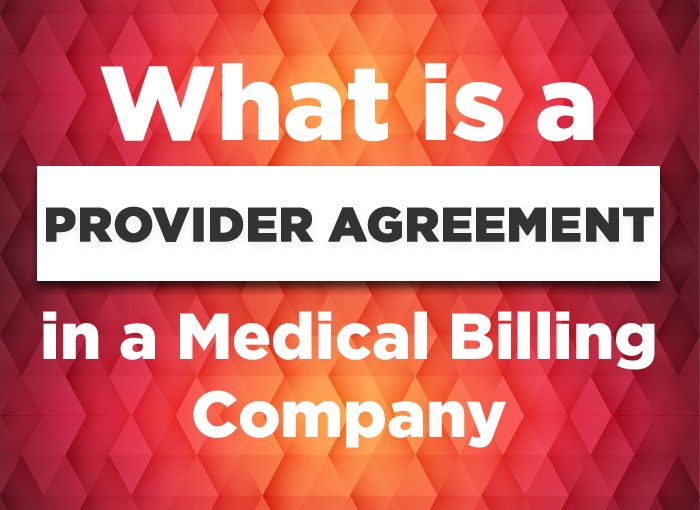What is a Provider Agreement in a Medical Billing Company
A company agreement is an important file in medical billing that outlines the contractual terms between healthcare vendors and coverage companies. This settlement guarantees easy compensation for services rendered to patients while defining the obligations of both events. Understanding the specifics of a company settlement is critical for scientific billing groups to ensure compliance, reduce claim denials, and optimize sales cycle control.
However, managing bills and filing claims is not a cakewalk due to a long list of guidelines laid by the federal government under various acts like HIPAA, SSA, etc. The hospitals are required to follow a specific set of guidelines to file medical claims and bill patients for various medical situations.
For example, the healthcare provider must know the correct use of modifiers, and medical codes while generating bills and filling Medicare claims. One can’t use modifier-25 to represent ‘partially reduced services’ while filing claims. The correct modifier to represent partially reduced services in the medical claims form is modifier-52. CMS clearly states that modifier-52 should be “under certain circumstances, a service or procedure is partially reduced or eliminated at the physician’s discretion.”
Definition of Provider Agreement
In a medical billing company provider agreement or service agreement is a legal document outlining the services and the terms under which the payment for those services is rendered. The service agreement obliges the health care provider to compensate for the medical billing company services without any failure. This means the health care provider cannot terminate the company’s services without compensating billing services.
In a few words, the provider agreement in a medical billing company is just the contact for medical billing between the health care provider and the billing company. A good medical billing company offers unmatched billing services by designing a service contract without any loopholes.
Elements of the Provider Agreement in Medical Billing Company
A good service agreement for medical billing must consist of the following elements:
- Billing Services Offered
- Billing Services Not Offered
- Cost of Services and Terms to Calculate the Cost
- Day of Beginning of Services/Effective Dates
- Asking for Patient Information
- Details to forwarding Payments Received from Insurance Payers and Patients
- Patient Privacy
- No Responsibility for Previously Billing Errors
- Role/Responsibilities of the Client
- Role/Responsibilities of the Medical Billing Company
- Agreement Termination Conditions
- Software Compatibility
Benefits of Provider Agreement in Medical Billing Company
- Compensation
- Transparency
- Correct Billing
- Saves Time
- Increased Chances of Maximum Reimbursement
- Reliable Services
The medical billing company and the health care provider must consult a legal expert to ensure the efficacy of the agreement. A good provider agreement in a medical billing company is designed to meet the requirements of the health care provider and avoid the billing problems that are likely to occur due to any issue. Both parties agree to fulfill their roles and responsibilities to make the billing process effective. This helps in preventing any fraud and/or failure to fulfill responsibilities.
Importance of a Provider Agreement in Medical Billing
1. Ensures Timely Payments
A well-defined issuer agreement facilitates a clinical billing company’s steady timely reimbursements by way of outlining price schedules and claim submission pointers.
2. Reduces Claim Denials
Adhering to the settlement minimizes claim denials, as vendors comply with the pre-established billing protocols and payer rules.
3. Enhances Revenue Cycle Management
A nicely negotiated settlement optimizes cash flow by reducing delays in bills and disputes.
4. Legal and Compliance Assurance
Provider agreements assist make certain compliance with federal and state guidelines, averting criminal issues and financial consequences.
Best Practices for Managing Provider Agreements
1. Thorough Review Before Signing
Providers ought to cautiously review the agreement terms, repayment charges, and duties earlier than signing.
2. Regular Agreement Audits
Medical billing companies should conduct periodic audits to ensure persevered compliance with the agreement.
3. Effective Communication with Payers
Maintaining open conversations with coverage payers enables treatment disputes and clarifies policy modifications.
4. Utilizing Credentialing Services
Outsourcing credentialing to experts guarantees that vendors meet payer necessities, decreasing claim rejections.
Conclusion
A provider settlement is the spine of a successful medical billing method. It defines the financial and operational courting between healthcare companies and coverage payers, ensuring clean claim processing and compensation. By gaining information on the important things additives, significance, demanding situations, and practices of issuer agreements, scientific billing companies can enhance revenue cycle control, reduce claim denials, and ensure compliance with regulatory requirements.



